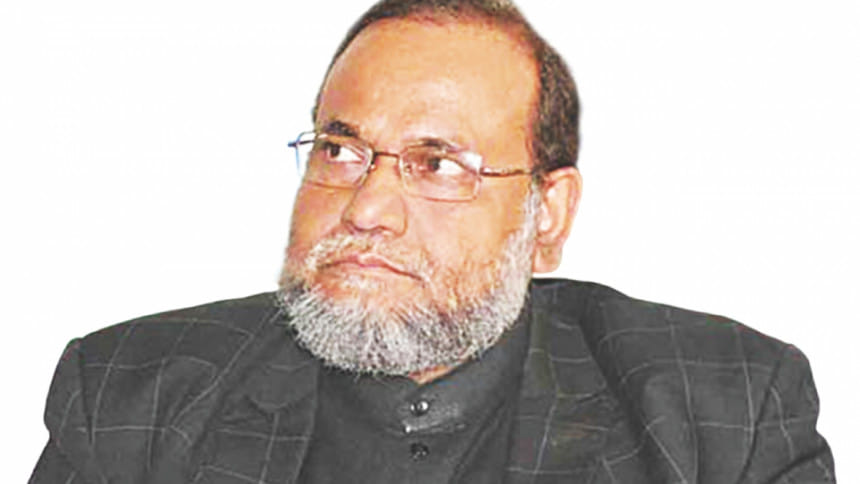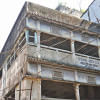Mir Quasem’s fate sealed

Bringing a six-year legal battle to a close, the Supreme Court yesterday dismissed war criminal Mir Quasem Ali's petition for reviewing its judgment that upheld his death penalty for committing crimes against humanity in 1971.
Around 10 hours after the dismissal of the plea, a copy of the full verdict was sent to Dhaka Central Jail around 7:00pm.
Jahangir Kabir, senior jail superintendent of the prison, told The Daily Star at 9:25pm that they received a copy of the verdict at 9:00pm.
They would send it to Kashimpur Central Jail-2, where the convict is kept at a condemned cell.
Quasem, widely considered as a top financer of anti-liberation party Jamaat-e-Islami, led ruthless militia Al-Badr in Chittagong to commit crimes against humanity during the Liberation War.
The 63-year-old Jamaat leader is now left with only one option -- seeking presidential clemency by confessing the crimes he committed 45 years back.
Talking to The Daily Star last night, Shahidul Alam Jhinuk, registrar at the International Crimes Tribunal, said his office sent a copy of the judgment to Dhaka Central Jail around 7:00pm.
Copies of the judgment were also sent to the Dhaka district magistrate, and the home and the law ministries, he added.
As per the precedents set in previous executions of war crimes convicts, the jail authorities will read out the judgment before the death-row convict. They will then ask him if he would seek presidential clemency.
The convict would get a "reasonable time" to reply, said prosecution lawyers.
If Quasem, a member of Jamaat central executive council, seeks mercy, his plea would go to the president through the home ministry. If he doesn't, the jail authorities would make preparations for his execution.
It cannot be said for sure how many days it would take for the authorities to complete the procedures for executing the verdict.
Previously, Jamaat leaders Motiur Rahman Nizami and Mohammad Kamaruzzaman were executed five days after the dismissal of their review pleas while another Jamaat leader, Ali Ahsan Mohammad Mojaheed, and BNP leader Salauddin Quader Chowdhury were hanged three days after the SC rejected their review petitions.
Besides, Jamaat leader Abdul Quader Mollah was hanged hours after the jail authorities received a short SC order on his review petition.
Quader Mollah, Kamaruzzaman and Nizami didn't seek presidential clemency.
Mojaheed and Salauddin were executed on November 22 last year after the president turned down their mercy petitions. Their families, however, claimed that the duo didn't seek mercy.
Quasem is the fifth Jamaat leader to get the death penalty for his notorious role in 1971.
At 9:02am yesterday, the five-member bench of the Appellate Division, headed by the chief justice, sat amid tight security.
“The petition is dismissed," Chief Justice Surendra Kumar Sinha pronounced in the packed courtroom, paving the way for the war criminal's execution.
Quasem was sentenced to death by the ICT-2 in November 2014.
Probe in the war crimes case against him began in July 2010. He was arrested on June 17, 2012, from the office of the daily Naya Diganta, a concern of Diganta Media Corporation, of which he was chairman.
According to the prosecution, Quasem, till November 5, 1971, was president of Chittagong town unit of Islami Chhatra Sangha, the then student wing of the Jamaat-e-Islami.
He was made general secretary of East Pakistan Islami Chhatra Sangha on November 6, 1971. He became one of the top leaders of Al-Badr, which was formed with the leaders and activists of Islami Chhatra Sangha.
During the Liberation War, Quasem set up a torture camp at Mahamaya Dalim Hotel in Chittagong and masterminded brutal torture and killing of many of the detainees.

The ICT-2 gave him the death penalty on two charges and different jail terms on eight other charges. He challenged the verdict at the apex court.
On March 8 this year, the SC upheld his death sentence on one charge -- the killing of young freedom fighter Jasim Uddin at Dalim Hotel -- and jail terms on six other charges for his involvement in abduction, confinement and torture of freedom fighters and innocent people.
It, however, acquitted him of the other three charges, including a murder charge on which he was sentenced to death by the ICT-2.
Quasem filed a petition seeking review of his convictions and sentences on June 19, and the apex court on Sunday fixed yesterday for giving verdict after it heard the petition for two days.
Delivering the judgment yesterday, the CJ said there was an “error” in the “operative portion” of the judgment on Quasem's appeal, as it didn't mention the sentence on charge no 14 (abduction, confinement and torture of Nasir Uddin Chowdhury) against him though he was found guilty on the charge.
The “error” has been modified, the CJ said, adding that the conviction and sentence of 10 years' imprisonment handed by the Tribunal-2 is maintained.
The other judges of the bench are Justice Syed Mahmud Hossain, Justice Hasan Foez Siddique, Justice Mirza Hussain Haider and Justice Mohammad Bazlur Rahman.
The SC released the 29-page verdict around 5:00pm and then sent it to the ICT.
Our Gazipur correspondent reports: Quasem learnt about the SC verdict through the radio at Kashimpur Central Jail-2 around 10:30am.
“He became a bit nervous, but he is physically well,” said Nashir Ahmed, jailer of the prison.
A few hours after the verdict, Jamaat called a 12-hour countrywide hartal today for what it said was the government's conspiracy to kill Quasem.
REACTIONS
Attorney General Mahbubey Alam said they were satisfied with the SC verdict, as the nation's expectations have been fulfilled through it.
ICT Chief Prosecutor Ghulam Arieff Tipoo said, “We are happy as we have got the expected judgment.”
Law Minister Anisul Huq said, “I am satisfied with the Supreme Court verdict as the nation has got justice.”
Quasem's counsel Khandker Mahbub Hossain alleged that the prosecution had brought false allegations and produced fake evidence before the court.
“As per the law, whatever verdict the apex court delivers is justice,” he said, adding that it is for the future generation and global legal experts to evaluate whether the verdict was right or not.
The ruling Awami League welcomed the verdict while the BNP kept mum as it did in the past after pronouncement of judgments in war crimes cases against other Jamaat leaders.
Different socio-political and cultural organisations hailed the verdict and brought out processions in different parts of the country.
The SC has so far dismissed six review petitions of convicted war criminals. The review petition of another war criminal, Delawar Hossain Sayedee, is pending with it.
In February 2013, the ICT-1 sentenced the Jamaat leader to death for war crimes, but the SC commuted the sentence to jail until death in September 2014.
Appeals of 15 more convicted war criminals are also pending with the SC.
Besides, the apex court is yet to deal with the government's appeal seeking the death penalty for ex-Jatiya Party lawmaker Abdul Jabbar for war crimes.
Jabbar, who is absconding, was given jail until death by the ICT-1.

 For all latest news, follow The Daily Star's Google News channel.
For all latest news, follow The Daily Star's Google News channel. 





Comments